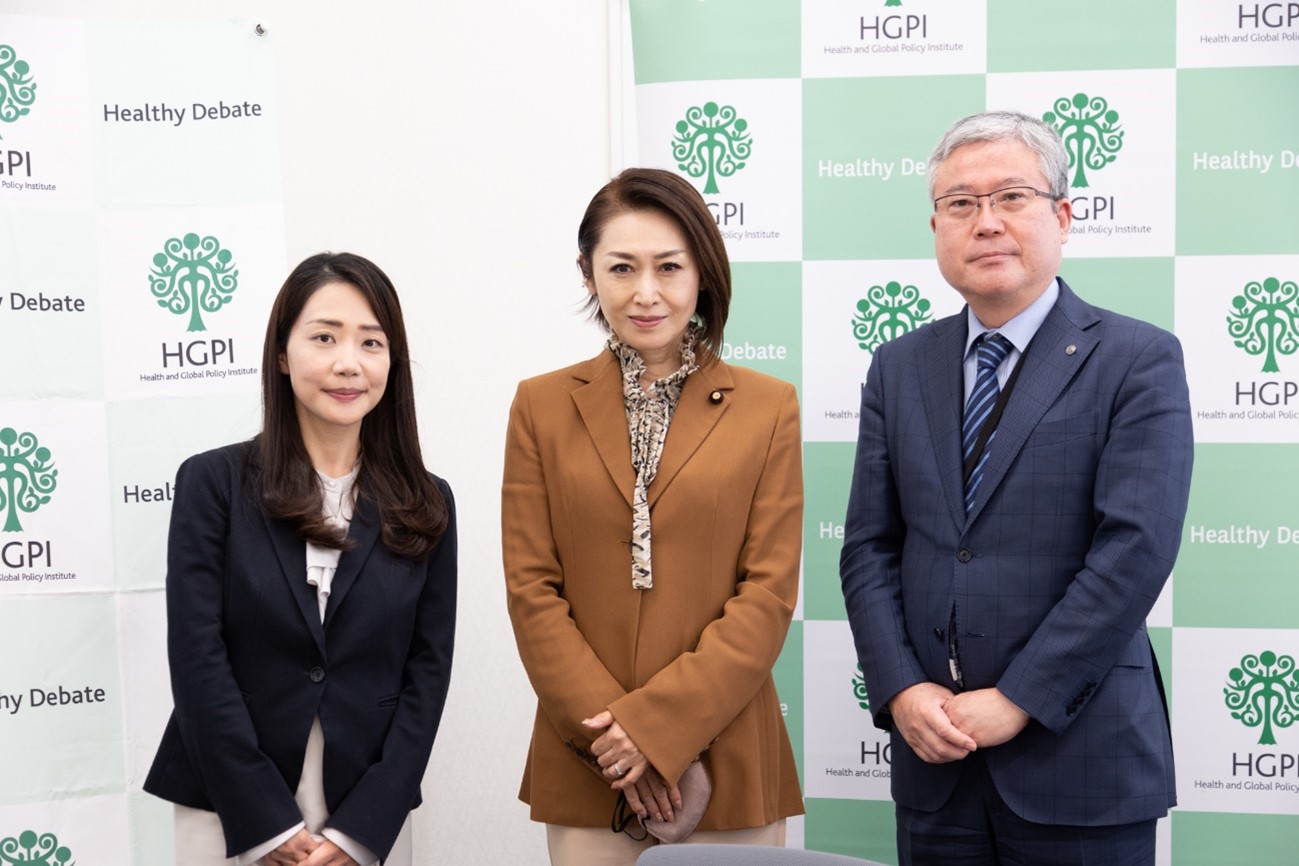[Event Report] Media Briefing on the Public Opinion Survey on Child-rearing in Modern Japan (Preliminary Report) (December 20, 2021)
date : 12/27/2021
![[Event Report] Media Briefing on the Public Opinion Survey on Child-rearing in Modern Japan (Preliminary Report) (December 20, 2021)](https://hgpi.org/en/wp-content/uploads/sites/2/wh-survey-2021md-top_ENG.jpg)
Alongside the release of the “The Public Opinion Survey on Child-rearing in Modern Japan: Aiming to Build a Society in Which People Who Want to Get Pregnant Can Do So” Preliminary Report, Health and Global Policy Institute (HGPI) Women’s Health Project held a media briefing at the Members’ Office Building of the House of Councillors.
To reverse the declining birthrate and achieve a target of 1.8 births per woman, the Government of Japan has implemented various laws and measures such as reviewing the child-rearing allowance and taking steps to eliminate daycare waiting lists, improving working conditions for young people, and providing parental leave to men. However, according to statistics presented in June 2021, the total fertility rate in 2020 was 1.34, making it the fifth consecutive year of decline. In response, subsidies for fertility treatments were newly expanded and discussions on expanding insurance coverage for fertility treatments are now underway. Many people feel these support measures are insufficient for meeting the needs and realities facing members of the child-rearing generation. To identify effective measures for achieving a society in which everybody who wants to get pregnant can do so, we conducted an online survey among 10,000 men and women ages 25 to 49 and reported the survey results at this media briefing.
At the media briefing, Professor Tadashi Kimura (Professor, Department of Obstetrics and Gynecology, Graduate School of Medicine, Osaka University; Director, Japan Society of Obstetrics and Gynecology) gave a lecture in which he spoke on issues related to this field in clinical settings and shared important gynecological knowledge. Closing remarks were given by Ms. Junko Mihara (Member, House of Councillors), who discussed current circumstances in society as a whole, issues identified by the survey, and expectations for future initiatives.
Moving forward, the Women’s Health Project will continue working to generate the policy options society needs to become a place where everybody who wants to get pregnant is able to do so.
The following topics were covered during the lecture.
Professor Tadashi Kimura (Professor, Department of Obstetrics and Gynecology, Graduate School of Medicine, Osaka University; Director, Japan Society of Obstetrics and Gynecology)
Problems related to menstruation
Two common problems for many women are menstrual pain and the volume and duration of menstrual flow. These two problems can be signs of underlying disorders that can reduce fertility in the future.
Treatment can reduce the progression of endometriosis, a common cause of menstrual pain. While 60% to 90% of adolescent women are aware of menstrual pain, only about 15% of them actually seek gynecological examinations. One of the main reasons many women avoid seeing a gynecologist is the pelvic examination that is performed during the visit. Pelvic examinations are necessary to diagnose underlying disorders, but if they are one of the main reasons women avoid seeking gynecological examinations, measures must be taken to address that such as by prioritizing therapeutic diagnosis or by revising medical service fee schedule point assignments to facilitate the usage of diagnostic imaging. In the future, we must consider how to best structure the healthcare provision system so primary gynecological care can be provided to adolescent women with dysmenorrhea, an issue for which early consultation is recommended.
Furthermore, it is not common for adolescent women to measure the volume of their menstrual flow or to compare themselves to others regarding menstrual flow volume and duration. When applicable, resources that are specific and are easy to visualize, like patient questionnaires from the U.S., should be referred to when volume or duration are abnormal to consider the presence or absence of organic diseases that cause excessive menstruation, such as uterine fibroids. Since there are methods of reducing menstrual flow when organic diseases are not present, appropriate information must be provided through opportunities like school education and corporate training or from sources like medical institutions and the media.
Problems related to pregnancy
In recent years, attitudes have shifted from “having children is a gift from nature” to “having children is a conscious choice.” This has resulted in the current situation in which people in Japan are postponing having children. As society changes, it is important everyone has a common understanding toward pregnancy, particularly the fact that it gets more difficult to have children as we age.
Problematic information provided by the media
About 30% of women after the age of 35 to about 70% after the age of 40 are diagnosed with infertility and it has been proven statistically that fertility rates decrease and miscarriage rates increase with age. However, it is not uncommon for the media to provide coverage to advanced maternal age pregnancies and births, which are rare occurrences, among celebrities and other people who can serve as influencers. For the sake of many citizens and other affected parties, I hope that information broadcast by the media is given closer consideration to ensure accurate information is being provided.
The following topics were discussed during the closing remarks.
Junko Mihara (Member, House of Councillors)
The current circumstances and issues of society as a whole, as shown by survey results
About 70% of respondents said they have no knowledge about women’s health or about reproductive health and rights. The lack of knowledge regarding health problems unique to women among women and throughout all of society is an urgent issue. We should pay close attention to the finding that there were gaps between respondents with children and respondents who were expecting their first child in endometriosis diagnosis rates and age of first gynecological examination. I believe gynecological examinations are connected to early disease detection and pregnancy.
Expectations for future initiatives
It is important to improve sex education by disseminating knowledge about gynecological disorders, actions to take to manage abnormal menstruation or Premenstrual Syndrome (PMS), and guidelines and other information for seeking gynecological examinations. These items are included in my proposed infertility prevention support package, which was compiled in July 2021. In addition, to establish a system that makes it easier for women to visit a gynecologist after their first period, education and awareness-raising activities for healthcare should be promoted through collaborative efforts with parties like educational institutions and Youth Café, an initiative operated by HGPI which provides easily-accessible consultations with midwives.
I would also like to request that those who wish to have children are provided with accurate information on how fertility declines with biological age, and for that information to not only be provided during school education, but through media coverage and corporate training as well. If we continue accumulating evidence and providing explanations, people will gradually start to understand. It is my sincere hope that, as a result, our society becomes a place where people who want to have children can do so and achieve their desired life plans.
Event overview
■ Date and time: Monday, December 20, 2021; from 13:00 to 14:30
■ Venue: B107, B1F, Members’ Office Building, House of Councillors (Address: 2-1-1 Nagata-cho, Chiyoda-ku, Tokyo)
■ Host: Health and Global Policy Institute (HGPI)
■ Program (Titles omitted)
13:00-13:05 Explanatory introduction
Takashi Yano (Associate, HGPI)
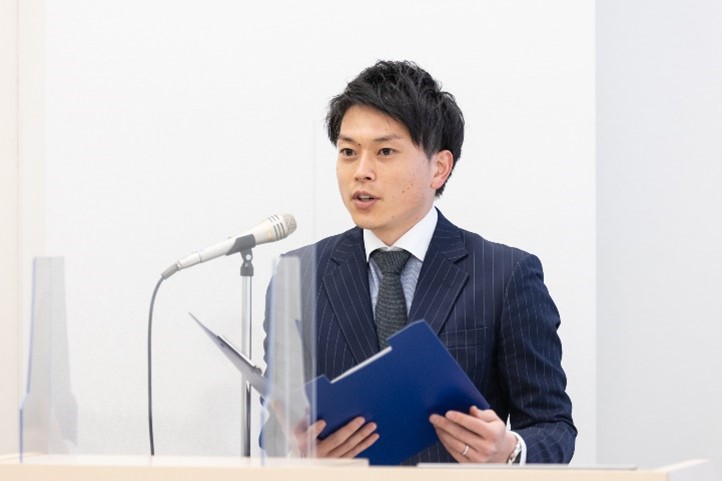
13:05-13:20 Lecture
Tadashi Kimura (Professor, Department of Obstetrics and Gynecology, Graduate School of Medicine, Osaka University; Director, Japan Society of Obstetrics and Gynecology)
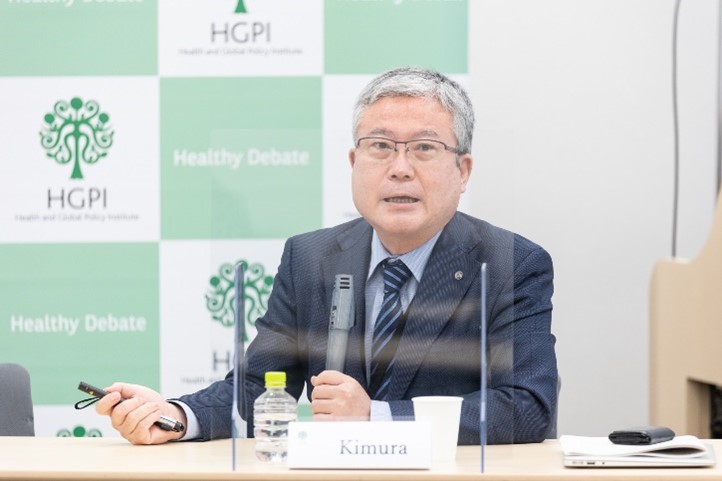
13:20-13:45 Presentation of survey results
Yuko Imamura (Manager, HGPI)
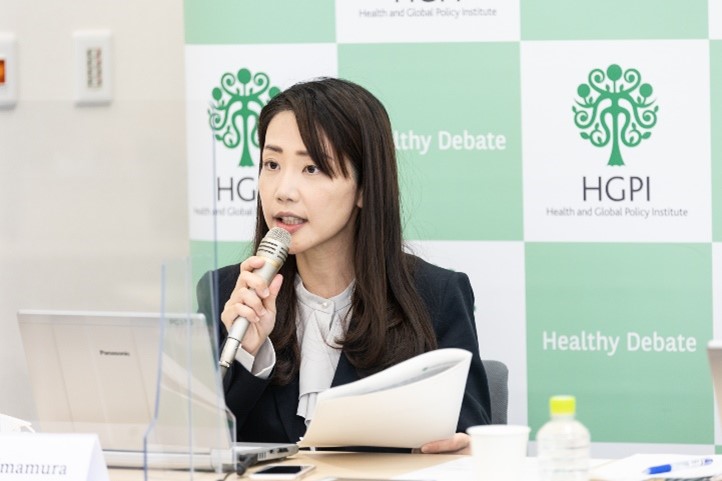
13:45-14:00 Question and answer session
14:00-14:05 Closing remarks
Junko Mihara (Member, House of Councillors)
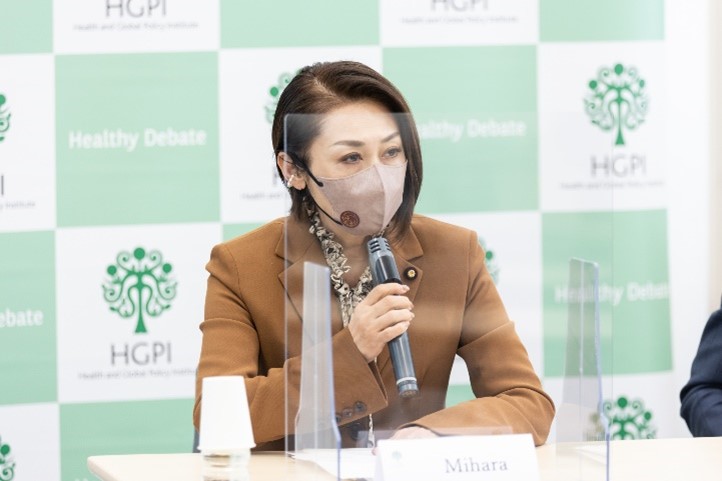
*After the program, a question and answer session was held at the venue until 14:30.
Top Research & Recommendations Posts
- [Policy Recommendations] The Path to a Sustainable Healthcare System: Three Key Objectives for Public Deliberation (January 22, 2026)
- [Research Report] The 2025 Public Opinion Survey on Healthcare in Japan (March 17, 2025)
- [Research Report] Perceptions, Knowledge, Actions and Perspectives of Healthcare Organizations in Japan in Relation to Climate Change and Health: A Cross-Sectional Study (November 13, 2025)
- [Policy Recommendations] Reshaping Japan’s Immunization Policy for Life Course Coverage and Vaccine Equity: Challenges and Prospects for an Era of Prevention and Health Promotion (April 25, 2025)
- [Research Report] The 2023 Public Opinion Survey on Satisfaction in Healthcare in Japan and Healthcare Applications of Generative AI (January 11, 2024)
- [Research Report] AMR Policy Update #4: Cancer Care and AMR (Part 1)
- [Public Comment Submission] “Assessment Report on Climate Change Impacts in Japan (Draft Overview)” (December 24, 2025)
- [Research Report] The Public Opinion Survey on Child-Rearing in Modern Japan (Final Report) (March 4, 2022)
- [Policy Recommendations] Developing a National Health and Climate Strategy for Japan (June 26, 2024)
- [Policy Recommendations] Achieving Equity in Multidisciplinary Pain Treatment and Support Systems for Pain Management (March 31, 2023)
Featured Posts
-
2026-01-09
[Registration Open] (Hybrid Format) Dementia Project FY2025 Initiative Concluding Symposium “The Future of Dementia Policy Surrounding Families and Others Who Care for People with Dementia” (March 9, 2026)
![[Registration Open] (Hybrid Format) Dementia Project FY2025 Initiative Concluding Symposium “The Future of Dementia Policy Surrounding Families and Others Who Care for People with Dementia” (March 9, 2026)](https://hgpi.org/en/wp-content/uploads/sites/2/dementia-20260309-top.png)
-
2026-02-05
[Registration Open] (Webinar) The 141st HGPI Seminar “Current Status and Future Prospects of Korea’s Obesity Policy: Voices of People with Lived Experience in Policy Promotion” (March 3, 2026)
![[Registration Open] (Webinar) The 141st HGPI Seminar “Current Status and Future Prospects of Korea’s Obesity Policy: Voices of People with Lived Experience in Policy Promotion” (March 3, 2026)](https://hgpi.org/en/wp-content/uploads/sites/2/hs141-top-1.png)




